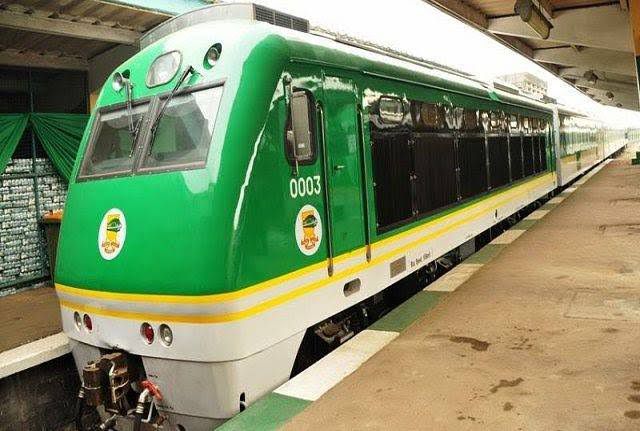Anxiety on the Rails: Abuja–Kaduna train journey in fear
Story by Shalom Kasim
When the 186-kilometre Abuja–Kaduna rail line was inaugurated in July 2016 by President Muhammadu Buhari, it was hailed as the dawn of a new rail era. The line, built with Chinese loans and technology, was meant to reduce pressure on the treacherous Abuja–Kaduna expressway which was notorious for kidnappings and highway robberies. In its early months, the train offered exactly that.
A short while later, the story changed. The fragility of the line became undeniable on October 20, 2021, when suspected insurgents planted explosives on the track near Rijana, Kaduna State, damaging the line and forcing a temporary suspension of services.
It was the first confirmed bombing of the Abuja–Kaduna railway. Then came March 28, 2022, the night Nigerians will not soon forget, when the northbound train passed through Katari, terrorists detonated an Improvised Explosive Device (IED) on the track, derailing coaches and opening fire on passengers.
At least eight people were killed, dozens were injured, and over 60 were abducted, including the Bank of Agriculture’s Managing Director, Alwan Ali Hassan. Then came the August 26, 2025 derailment when a passenger train derailed near Kubwa, Abuja, leaving at least 6 passengers injured.
Poor Maintenance
Within hours, the corporation’s Managing Director, Engineer Fidet Okhiria, admitted publicly that the derailment resulted from maintenance lapses, not sabotage. This wasn’t the first time an NRC’s M.D had stood before Nigerians to explain why the nation’s most important rail line had failed.
READ ALSO: The Generals’ Call, Our Rails, and Our Fear for the Future (1), by Hassan Gimba
The first real shock to the Abuja–Kaduna rail corridor came on October 20, 2021. Up until then, most problems had involved theft of track components and maintenance lapses. But that night, northbound passengers heard a thunderous blast as their train approached Rijana, Kaduna State.
Nigerian Railway Corporation (NRC) engineers later confirmed that improvised explosives had been planted on the track, damaging rails and forcing the train to halt. No lives were lost, but the incident marked the first deliberate bombing of the Abuja–Kaduna line. Fortunately, unlike later attacks, no bandits stormed the train that night.
Security personnel escorted passengers back to Abuja after hours of waiting in the dark. NRC technicians worked overnight to assess the damage. By morning, the corporation announced an indefinite suspension of Abuja–Kaduna services.
To quell the fears, the federal government quickly announced the deployment of more armed escorts on trains, drone surveillance along vulnerable sections of the corridor, and tighter patrols by police and military units.
NRC officials also mentioned installing track detection systems to identify tampering, but insiders admitted the measures were patchy.
READ ALSO: 6 passengers injured in Abuja-Kaduna train derailment – NSIB
Warning Signs Ignored
In hindsight, the October 2021 bombing was a warning sign that the Abuja–Kaduna line was no longer immune to the country’s worsening insecurity. But at the time, officials treated it as an isolated incident. Within days, repairs were made and services resumed.
NRC reassured passengers that “additional measures” had been taken, though they declined to disclose specifics. The public’s attention soon shifted elsewhere, and ridership numbers climbed back up by early 2022. Less than five months later, in March 2022, insurgents struck again, this time with far deadlier consequences.
On March 28, 2022, what had long been Nigeria’s most celebrated rail project became the site of its worst security catastrophe. That evening, the train, carrying hundreds of passengers from Abuja to Kaduna, derailed near Katari, Kaduna State, due to an explosion. The assailants then opened fire, sending passengers scrambling for safety. By dawn, at least 8 to 10 people were confirmed dead, with many more injured.
Among the victims were high-profile individuals: Amin Mahmoud, a youth leader of the ruling APC; Dr. Chinelo Megafu, a medical doctor who cried out “I’ve been shot” on Twitter before succumbing to injuries; Tibile Mosugu, a young lawyer; and Musa Lawal-Ozigi, secretary-general of the Trade Union Congress.
The Perils of Kidnapped Passengers
But the worst terror came in the hours that followed: over 60 passengers were kidnapped. The Nigerian Air Force carried out aerial strikes against suspected bandit camps in the forests between Kaduna and Niger States, reportedly killing over 30 insurgents.
READ ALSO: Chaos on Kaduna–Abuja rail line as train derails, several cabins overturn (Videos)
The NRC, meanwhile, began the process of track repair, and by early May 2022, the tracks had been joined, and stabilisation efforts had been completed. When services eventually resumed in December 2022, the NRC carried a new and reduced form: Only one train operated, making a single round-trip daily; travellers now needed to verify identity using NIN and valid phone numbers during ticket purchase; visual surveillance cameras were installed onboard. Everything seemed to be ‘settled.’ Then, 2023 entered.
On the afternoon of Friday, January 27, 2023, a passenger train en route from Kaduna to Abuja derailed just minutes before reaching Kubwa station in the Federal Capital Territory (FCT). The derailment occurred around 3:15 p.m., as the train approached Kubwa Station in Abuja. NRC’s Director of Operations, Niyi Alli, confirmed there were no injuries or fatalities, and all passengers disembarked safely.
Rail services across the Abuja–Kaduna corridor were suspended indefinitely pending investigations and repairs. By Tuesday, January 31, NRC announced service would resume with a revised schedule: four daily trips (two from Abuja and two from Kaduna) Things went well. For a short time, then…
On the morning of May 26, 2024, just one hour after departing Rigasa Station in Kaduna at approximately 8:05 a.m., an Abuja-bound passenger train derailed near Jere, Kaduna State, leaving commuters stranded and officials scrambling to respond.
The train, designated KA2/loco 2702, departed Kaduna with 685 passengers and crew on board. At around 9:28 a.m., as it approached Jere station, it encountered difficulty at a switch point (where rail tracks diverge or converge). The baggage van (BVA) and one passenger coach derailed, dragging approximately 86 feet before coming to a halt.
READ ALSO: Trailer crushes 2 vigilantes to death
Remarkably, no passengers or crew were injured. All on board were safely evacuated and transported to Abuja, arriving at about 12:32 p.m., slightly behind schedule.
The derailed coaches, along with the front locomotive, remained at the site. Despite the derailment, the Nigerian Railway Corporation (NRC) assured continuity of services on the Abuja–Kaduna corridor.
About two weeks later, on the afternoon of Wednesday, June 5, 2024, an Abuja–Kaduna passenger train derailed near Asham station in Kaduna State, less than half an hour after departing Kubwa, Abuja.
The train derailed at approximately 3:52 p.m., shortly after leaving Kubwa station, coming to a halt near Asham in Kaduna State. Passengers were left stranded on board for over three hours before being safely returned to Idu (Abuja) by alternative means.
NRC’s Deputy Director of Public Relations, Yakub Mahmood, issued a statement attributing the derailment to the removal of track fastening clips by vandals, which was a pattern that had caused previous derailments, including the then-recent May incident.
READ ALSO: Chinese bank approves $254.76m loan for Kano-Kaduna railway
The most recent mishap happened on the morning of Tuesday, August 26, 2025, when a passenger train bound for Kaduna derailed just minutes after departure from Abuja, between Kubwa and Asham stations, around kilometre 49. The derailment occurred at approximately 11:09 a.m., just as the train was leaving Kubwa Station, heading toward Asham.
Officials later confirmed six passengers sustained injuries, ranging from minor to moderate; importantly, no deaths were recorded. The Nigerian Safety Investigation Bureau (NSIB) immediately deployed a technical “go-team” to the scene to investigate. The next day, Kayode Opeifa, Managing Director of the Nigerian Railway Corporation, said, “Beyond apologising to Nigerians… I take full responsibility.” He added that reconstruction would begin only after NSIB cleared the track, followed by a safety audit.
NRC also mobilised emergency and medical teams immediately, aiding the evacuation of 618 individuals, including passengers, crew, catering, cleaning, and medical staff, mostly returning them safely to Idu and Kubwa stations.
A Recurring Calamity
A lot has happened to our railways, so much so that the growing lack of trust in them by Nigerians is becoming justified. There is so much to be done to salvage the Abuja–Kaduna railway and restore public trust, and it all comes down to moving from excuses.
The NRC must adopt strict, routine track inspections just as any standard railway would. The embarrassing theft of highly consequential railway equipment must be stopped by making those parts harder to steal and cutting off the resale market. This should start with licensing scrap dealers around the corridor and enforcing strict penalties for both sellers and buyers.
READ ALSO: Abuja metro rail transports over 250,000 passengers in 100 days – Official
Investigations must also stop being box-ticking exercises. Every recommendation from the Nigerian Safety Investigation Bureau should come with timelines for action, made public and tracked until completed. Funding must be ring-fenced so that money for maintenance is always available (from a mix of ticket sales and government support, instead of scrambling for cash after disasters).
The NRC has to be transparent with Nigerians. If a derailment happens, Nigerians should immediately see what is wrong, what is being done, and when it will be fixed. The recent admission of fault by the NRC boss is a step forward, but apologies must now translate into measurable timelines, or the line will remain trapped in the same cycle of crisis and denial.
Follow the Neptune Prime channel on WhatsApp:
Do you have breaking news, interview request, opinion, suggestion, or want your event covered? Email us at neptuneprime2233@gmail.com





